 During the trial on March 30, Father Ly Van Nguyen’s mouth was physically muzzled after he recited four lines of his own poetry.``Communist trial of Vietnam / A lewd comedy for years / Jurors a bunch of baboons / Servants of dictators, who are you to judge?’’International human rights groups condemned the sentencing, which took only five minutes without a defense lawyer. ``This sentence means Father Ly will be a prisoner of conscience for the fourth time in two decades,’’ noted Amnesty International’s Deputy Asia Pacific Director, Tim Parritt. ``It is indicative of a broader crackdown on dissent by the Vietnamese authorities that has been intensifying since the country held the APEC (Asia-Pacific Economic Cooperation) meeting last November.’’
During the trial on March 30, Father Ly Van Nguyen’s mouth was physically muzzled after he recited four lines of his own poetry.``Communist trial of Vietnam / A lewd comedy for years / Jurors a bunch of baboons / Servants of dictators, who are you to judge?’’International human rights groups condemned the sentencing, which took only five minutes without a defense lawyer. ``This sentence means Father Ly will be a prisoner of conscience for the fourth time in two decades,’’ noted Amnesty International’s Deputy Asia Pacific Director, Tim Parritt. ``It is indicative of a broader crackdown on dissent by the Vietnamese authorities that has been intensifying since the country held the APEC (Asia-Pacific Economic Cooperation) meeting last November.’’Vietnam intermittently plays a cat-and-mouse game with its political dissidents, arresting and releasing its most famous activists while those less visible are disappeared. Since March, however, Vietnam has launched one of the worst attacks on dissidents in 20 years. Among those arrested with Father Ly were Nguyen Van Dai and Le Thi Cong Nhan. All three were charged with carrying out propaganda against the Socialist Republic of Vietnam, under article 88 of the Penal Code.
If convicted, Le and Dai face sentences of up to 20 years in prison.
The arrest and subsequent disappearance of lawyers Le Quoc Quan and Tran Thuy Trang, however, are particularly alarming. Both are well known. After returning from a fellowship at the National Endowment for Democracy in the United States, Quan was arrested March 8 and charged with attempting to overthrow the Hanoi regime. The day before, Trang, another young lawyer in Ho Chi Minh City, was reportedly arrested by 60 security police. She has not been heard from since. According to Human Rights Watch, Trang’s family was forced to sign documents promising not to discuss the arrest.
Speculation abounds. Why now? Vietnam, after all, has been granted membership in the World Trade Organization and made its entrance to the world’s economic stage last November when it hosted its first Asia Pacific Economic Cooperation conference. Its gross national product has been growing at a steady and impressive 7 percent for the last several years, and while political dissent is not allowed, its population is experiencing far more personal freedoms than during the cold war. Many are allowed to travel overseas. Private capitalism is all the rage. Movement within Vietnam is permitted freely. There’s a middle class with disposable income and access to the Internet. Vietnamese media, too, while still controlled by the state, have proliferated and some have been pushing the envelope to cover stories of corruption and even official wrongdoings.
Perhaps that’s precisely why, at least in the eye of the ruling communist elites, the crackdown seems to be needed: to maintain absolute political power. Political movements are brewing along with an increasingly wealthy and educated population, especially now that the population is growing more sophisticated and politically aware. Voices of dissent are heard daily, if not on the op-ed pages, then at least on the streets.
Nguyen Van Dai, an outspoken dissident, is one of a handful of practicing human rights lawyers in Vietnam. He founded the Committee for Human Rights in Vietnam in 2006 and was recently awarded the prestigious Hellman/Hammett prize for persecuted writers. Father Ly is a co-founder of Bloc 8406 — a political movement that made its entrance to Vietnam’s public stage on April 8, 2006, when it published "Manifesto for Freedom and Democracy." Two days earlier, it had issued an "Appeal for Freedom of Political Association."
These documents boldly challenged the Vietnamese government to uphold individuals’ rights to free expression, association and participation in political affairs.
Hanoi swiftly retaliated against both.
Hanoi swiftly retaliated against both.
"Several key organizers of Bloc 8406 and their families have been harassed and imprisoned, showing that the Vietnamese government is still trying to silence its critics," noted Sophie Richardson, deputy Asia director for Human Rights Watch. "Targeting the most vocal, visible activists sends a message to the others: Don’t speak out, or you’ll suffer the same fate."
If Hanoi was hesitant to act before President Bush’s visit during the APEC meeting last November, it was not afterward. For a president who touted "freedom" and "democracy" in the Middle East, Bush came bearing an unexpected gift — a license, as it were — for the government to use against its dissidents.
Though the U.S. president originally had hoped to give Vietnam normal trading status, that deal was delayed in Congress. Embarrassed by having no gift in hand, he dropped Vietnam from the list of nations that severely curtail religious freedom instead, even as these violations continued unabated.
The widely published photo of Bush smiling amicably under the bust of Ho Chi Minh augured terribly bad feng shui for Vietnamese human rights activists. It clashed with images of heavily guarded homes of political dissidents just a few kilometers from the APEC meeting in Hanoi.
Freedom and democracy, apparently, were far from Bush’s mind in Vietnam.
The United States once served as the bright and shiny model of democracy for many in Vietnam. But no longer.
Since Bush’s visit, the list of those arrested has grown. Nguyen Tan Hoanh, Doan Van Dien, Doan Huy Chuong, Tran Thi Le Hong, Le Ba Triet and Nguyen Tuan are among hundreds of political and religious prisoners in Vietnam, including cyber-dissident Nguyen Vu Binh, at least nine members of the Cao Dai religion, 10 Hoa Hao Buddhists and more than 350 ethnic minority Christian "Montagnards" from the Central Highlands.
In Vietnam, the word censorship is the colloquial phrase — bich mien — to cover the mouth. The picture of Father Ly’s muzzling seems a literal enactment of an old cliché. But in the old days, his image wouldn’t have gotten out of the country so quickly or circulated so widely, nor would his voice be heard at all. Back then, before the Cold War ended, he would have disappeared without a trace.
The wind of change seems to be on the dissidents’ side. Thanks to high-tech communications such as the Internet, cell phones and satellite dishes, and increasing interactions with foreigners, Vietnam has a more informed, and therefore, increasingly restless, citizenry.
The Vietnamese word for leader — lanh dao — literally means "bearer of the truth (or the way)." Such leadership is non-existent among communist party leaders since Ho Chi Minh. These days, the carriers of the dao are identified with dissidents like Father Nguyen Van Ly and human rights lawyers like Nguyen Van Dai and Le Thi Cong Nhan, prisoners of conscience with fearless spirit and indomitable strength.
And so, if one were to peel away the policeman’s hand from Father Ly’s mouth, the rest of his poem may go something like this: "You can cover our mouths, blind our eyes / We will still speak, and see / Your rotten ideology is at an end / Your cruelty the sign of weakness / Change is coming! Change is coming! / And we, the people, will be free."
Lam is editor of New America Media and author of ``Perfume Dreams: Reflections on the Vietnamese Diaspora.’’

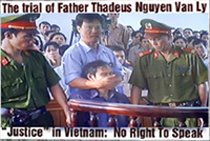
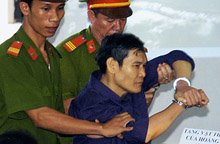
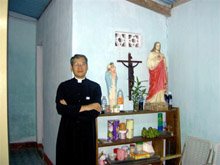


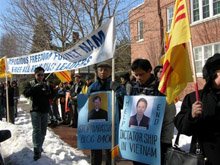




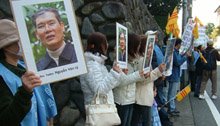
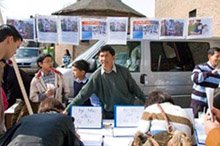


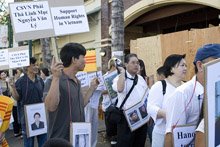
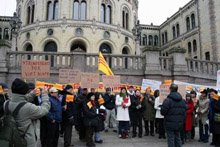
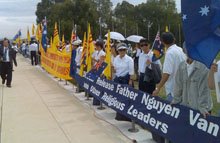




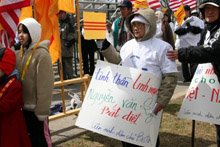
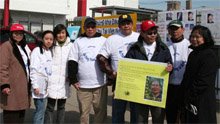
No comments:
Post a Comment